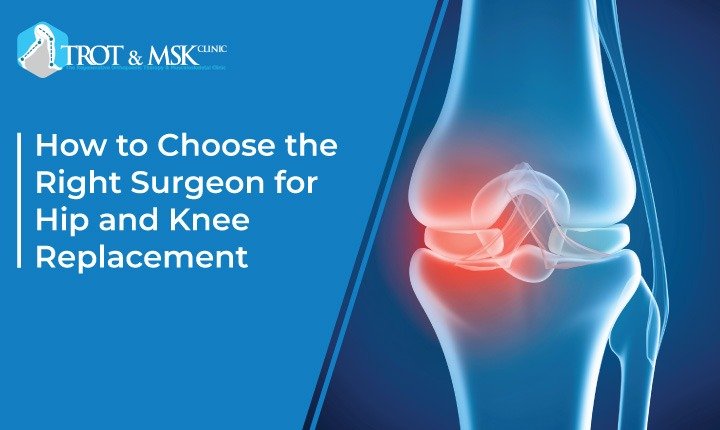When it comes to your mobility, few decisions are as crucial as selecting the right surgeon for hip or knee replacement surgery in Karachi. This isn’t just a medical procedure; it’s a life-changing journey toward reclaiming your freedom and vitality. With so many options available, how do you navigate this important choice? In this guide, we’ll walk you through essential factors that will empower you to make an informed decision ensuring that when the time comes to take those first steps post-surgery, you’re in the best hands possible. Dr. Shohab Hyder Shaikh is a renowned orthopedic surgeon in Karachi, known for his expertise in hip and knee replacement surgeries. Let’s dive into what makes a great orthopedic surgeon and how you can find one who aligns with your needs!
INTRODUCTION TO HIP AND KNEE REPLACEMENTS
Hip and knee replacements can be life-changing procedures. They restore mobility, alleviate pain, and significantly improve quality of life. But the success of these surgeries heavily relies on one crucial factor: the surgeon you choose. With so many options available, finding the right surgeon can feel overwhelming. Making a wrong choice could lead to complications or suboptimal outcomes that impact your recovery and future well-being. The good news is that by understanding key factors like experience, patient reviews, and hospital affiliations, you can confidently navigate this important decision-making process. Let’s explore how to find the perfect fit for your hip or knee replacement journey—because when it comes to your health, nothing less than excellence will do.
WHY CHOOSING THE RIGHT SURGEON IS IMPORTANT?
Choosing the right surgeon for hip and knee replacement is critical to your overall success. A skilled surgeon can significantly impact both the procedure’s outcome and your recovery process. Surgical expertise reduces complications, ensuring a smoother operation. With experience in advanced techniques, a qualified surgeon can provide better results that lead to improved mobility. Moreover, selecting an experienced professional fosters trust. You want someone who listens to your concerns and answers questions thoroughly. A well-chosen surgeon also understands the nuances of joint replacement from pre-operative assessments through rehabilitation. Their guidance will be invaluable throughout this journey. Ultimately, making an informed choice gives you peace of mind as you embark on this life-changing decision. Your health deserves nothing less than the best care available.
FACTORS TO CONSIDER WHEN CHOOSING A SURGEON
- Experience and Specialization
- Board Certification and Accreditation
- Patient Reviews and Testimonials
- Patient reviews and testimonials provide invaluable insight into the surgeon’s practice. They offer a glimpse of what you can expect during your journey.
- Look for detailed accounts that share experiences, outcomes, and interactions with the surgical team. Positive feedback about pain management or post-operative care is particularly telling.
- Pay attention to recurring themes in the reviews. If multiple patients mention how attentive or compassionate a surgeon is, it’s likely indicative of their approach to care.
- Conversely, red flags such as consistent complaints regarding poor communication or complications should raise concerns.
- Engaging with online forums or support groups may also lead you to firsthand accounts from individuals who have undergone similar procedures. Their stories can guide your decision-making process effectively.
HOSPITAL AFFILIATION AND RESOURCES
When selecting a surgeon for hip and knee replacement, consider their hospital affiliation. The quality of the facility plays a crucial role in your overall care. Top-tier hospitals often have advanced technology and resources. These can directly impact surgical outcomes and recovery times. Look for institutions that specialize in orthopedic surgeries. A well-equipped hospital will offer comprehensive support services, from physical therapy to pain management. This integrated approach ensures you receive holistic care throughout your journey. Additionally, check if the surgeon has privileges at multiple hospitals. This may indicate a strong reputation within the medical community. Visiting the hospital beforehand can also ease anxiety about your procedure. Observe cleanliness, staff interactions, and available amenities to get a feel for where you’ll be treated.
QUESTIONS TO ASK DURING CONSULTATIONS WITH SURGEONS
During your consultation with a surgeon, asking the right questions is crucial. Start by inquiring about their experience specifically related to hip and knee replacements. You want to know how many procedures they perform each year. Next, ask about their approach to surgery. Understanding their surgical technique can provide insight into whether it aligns with your expectations and comfort level. Don’t forget to discuss potential complications and recovery timelines. Knowing what challenges might arise prepares you for the journey ahead. It’s also wise to ask about postoperative care and rehabilitation plans. A comprehensive recovery strategy can significantly impact your long-term results. Lastly, inquire about patient support systems within their practice. Having access to resources or counseling during this time can make a difference in your overall experience and satisfaction.
RESEARCHING SURGEONS: ONLINE TOOLS AND RESOURCES
Researching surgeons can feel daunting, but the internet offers a wealth of resources at your fingertips. Start by exploring specialized medical websites that provide comprehensive databases of orthopedic surgeons. These platforms often include information on their credentials, specialties, and years of experience. Don’t overlook social media and forums. Patient experiences shared online can offer insights into not only surgical skills but also bedside manners. Joining community groups focused on joint replacement might reveal valuable recommendations. Another useful tool is the hospital’s website where you plan to have surgery. Many institutions list affiliated surgeons along with their qualifications and patient outcomes. Lastly, utilize review sites like Healthgrades or Vitals for unbiased feedback from previous patients. Engaging in thorough research empowers you to make an informed decision about your future care provider for hip and knee replacements.
RED FLAGS TO WATCH OUT FOR WHEN CHOOSING A SURGEON
Tips for Building a Good Doctor-Patient Relationship during Joint Replacement Surgery Journey Open communication is essential. Share your concerns, fears, and expectations with your surgeon. This transparency helps build trust and ensures that you are both on the same page. Be proactive in asking questions during consultations. Don’t hesitate to seek clarification on procedures, recovery times, or any other uncertainties. Knowledge empowers you as a patient. Listening is equally important. Pay attention to your surgeon’s recommendations and advice regarding pre-operative care and rehabilitation plans. This cooperation can greatly influence your recovery journey. Establish regular check-ins post-surgery to discuss progress and any issues that arise during healing. Maintaining this connection fosters a supportive environment for both you and your surgeon. Lastly, show appreciation for their efforts throughout the process—small gestures like thank-you notes can strengthen this professional bond while creating a more comfortable atmosphere for future interactions.
CONCLUSION
Choosing the right surgeon for hip and knee replacement is a significant decision that can greatly impact your recovery and overall quality of life. It’s essential to take the time to research, ask questions, and assess all available options before making this important choice. The journey begins with understanding your needs and preferences. Look for a surgeon who not only possesses the necessary skills but also communicates effectively. Building trust in your doctor-patient relationship will enhance your experience throughout the surgery process. Use online tools to read patient reviews, verify credentials, and explore surgical outcomes. If needed, consult with multiple surgeons; finding the right fit can make all the difference. By paying attention to factors like experience, specialization, hospital affiliation, and personal comfort level with a surgeon’s approach, you are setting yourself up for success on your path toward pain relief and improved mobility after joint replacement surgery. Always watch for any red flags during your search—this is about ensuring you receive optimal care tailored just for you. Make informed choices that resonate with both medical expertise and personal rapport as you embark on this life-changing journey toward reclaiming an active lifestyle again.







